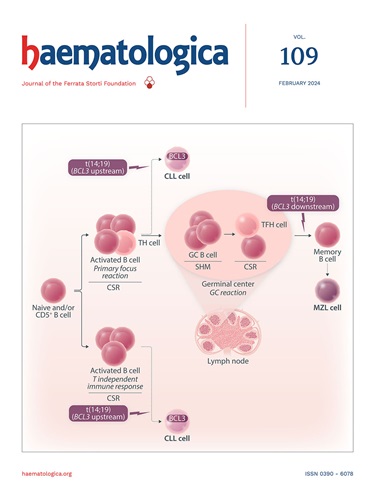在抗磷脂综合征中,对不同药物敏感的机制介导了促粘附和促血栓形成的血小板表型。
IF 7.9
1区 医学
Q1 HEMATOLOGY
引用次数: 0
摘要
抗磷脂抗体(aPL)介导血小板和白细胞与受损内皮的相互作用,导致抗磷脂综合征(APS)血管病变。本研究旨在了解维持促粘附/血栓性血小板表型的机制以及不同药物的体外作用。我们纳入34例原发性APS (PAPS)患者和12例健康受试者(HS)。根据2023年ACR/EULAR分类,所有患者均有中/高aPL水平,并伴有血管/产科症状。在体内,我们通过流式细胞术评估血小板活化标志物[p -选择素,活化GPIIbIIIa (aGPIIbIII)],组织因子(TF), ApoER2和β2GPI表达以及血小板单核细胞和粒细胞聚集物(PMA和PGA)]。体外研究抗血小板和抗炎药物对不同aPL亚群诱导的血小板活化的影响。PAPS患者表现出更高比例的循环ApoER2pos-、p -选择pos-、aGPIIbIIIapos-、tfpos -血小板和tfpos -血小板-白细胞聚集。在体外,HS血液与PAPS血浆孵育完全再现了在体内发现的激活。抗-β 2gpi - domain (D)1,而非抗- D4、5,IgG仅上调血小板TF表达,IL-6的加入也诱导P-Selectin和aGPIIbIIIa上调。IL-6受体阻断单克隆抗体可阻止由PAPS血浆或总IgG加外源性IL-6介导的前粘附/凝固血小板表型和血小板-白细胞聚集体的形成。阿司匹林和P2Y12抑制剂能完全抑制血小板活化,羟氯喹(HCQ)不能抑制TF的表达。PAPS患者表现出循环前粘附/凝血(tf阳性)血小板和血小板-白细胞聚集,由a2gpi - d1依赖性IgG和炎症触发因子介导。阿司匹林和P2Y12抑制剂显著抑制apl介导的p -选择素和TF上调,而HCQ仅影响粘附表型,可能不足以预防血小板介导的血栓形成。本文章由计算机程序翻译,如有差异,请以英文原文为准。
Mechanisms sensitive to different drugs mediate a pro-adhesive and pro-thrombotic platelet phenotype in anti-phospholipid syndrome.
Antiphospholipid antibodies (aPL) mediate platelet- and leukocyte-interaction with damaged endothelium, contributing to antiphospholipid syndrome (APS) vasculopathy. This study aimed to understand the mechanisms sustaining the pro-adhesive/-thrombotic platelet phenotype and the in vitro effects of different drugs. We included thirty-four primary APS (PAPS) patients and twelve healthy subjects (HS). All patients had medium/high aPL levels with vascular/obstetric symptoms according to the 2023 ACR/EULAR classification. In vivo, we evaluated by flow-cytometry platelet activation markers [P-selectin, activated GPIIbIIIa (aGPIIbIII)], Tissue Factor (TF), ApoER2 and β2GPI expression and plateletmonocyte and-granulocyte aggregates (PMA and PGA)]. In vitro, the impact of antiplatelet and anti-inflammatory drugs on platelet activation induced by different aPL subpopulations was investigated. PAPS patients exhibited greater percentages of circulating ApoER2pos-, P-selectinpos-, aGPIIbIIIapos-, TFpos-platelets, and TFpos-platelet-leukocyte aggregates. In vitro, HS blood incubation with PAPS plasma fully reproduced the activation found in vivo. While anti-β2GPI-Domain(D)1, but not anti- D4,5, IgG upregulated platelet TF expression only, the addition of IL-6 also induced P-Selectin and aGPIIbIIIa upregulation. An IL-6 receptor-blocking monoclonal antibody prevented the proadhesive/- coagulant platelet phenotype and the formation of platelet-leukocyte aggregates mediated by PAPS plasma or by total IgG plus exogenous IL-6. While aspirin and P2Y12 inhibitor fully inhibited platelet activation, hydroxychloroquine (HCQ) did not blunt TF expression. PAPS patients exhibit circulating pro-adhesive/-coagulant (TF-positive) platelets and plateletleukocyte aggregates mediated by a2GPI-D1-dependent IgG and an inflammatory trigger. While Aspirin and P2Y12 inhibitor significantly inhibited the aPL-mediated P-Selectin and TF upregulation, HCQ affected the adhesion phenotype only, and might not be adequate to prevent plateletmediated thrombosis.
求助全文
通过发布文献求助,成功后即可免费获取论文全文。
去求助
来源期刊

Haematologica
医学-血液学
CiteScore
14.10
自引率
2.00%
发文量
349
审稿时长
3-6 weeks
期刊介绍:
Haematologica is a journal that publishes articles within the broad field of hematology. It reports on novel findings in basic, clinical, and translational research.
Scope:
The scope of the journal includes reporting novel research results that:
Have a significant impact on understanding normal hematology or the development of hematological diseases.
Are likely to bring important changes to the diagnosis or treatment of hematological diseases.
 求助内容:
求助内容: 应助结果提醒方式:
应助结果提醒方式:


